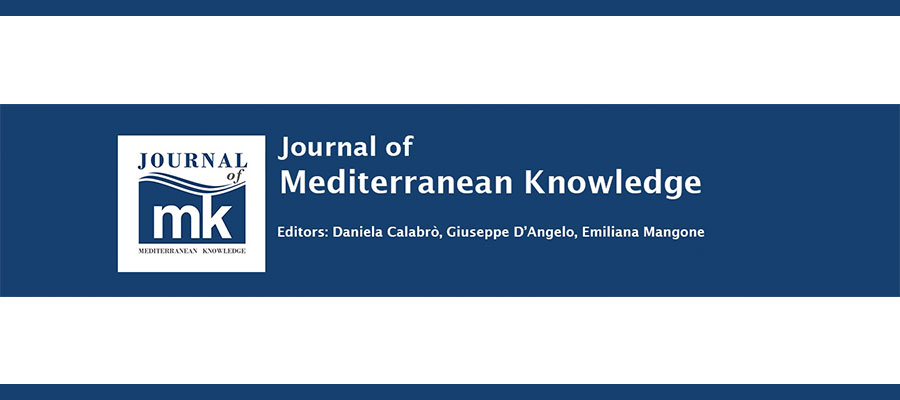Borders is the theme of the 1st Issue of Journal of Mediterranean Knowledge-JMK, published by the ICSR Mediterranean Knowledge.
The primary objective is to initiate a debate on the studies and research about different forms of tangible and intangible knowledge of, and within, the Mediterranean region. The aim is that of creating tools for the planning, management and evaluation of local actions that may produce a positive effect on the Europeanization and on the citizens’ perception of Europe. However, all this cannot take place unless it goes through a radical analysis of the concept of “Border”. Contrary to all metaphysics, ancient and modern, that has sought to immunize the human experience - “the air trips of the soul” as Plato had defined them - a permanent open space needs to be opened for discussion and reflection among the human, philosophical and social sciences. Thus, the aim is that of promoting free thought which is not limited to any particular identity, open to knowledge through a multidisciplinary and interdisciplinary approach. From the humanities and social fields (history, philosophy, sociology, anthropology, philology, history of art etc.) to the economic and legislative areas (economics, law, information sciences etc.), the focus must be on the promotion of cultural heritage, the transmission of thought, traditions, languages, as well as ethical, moral and religious values of the Mediterranean region before any political borders that lead to exclusion and immunization.
The current geographical representation of Europe, conveyed since the introduction of the education system, represents it as a “product” of classical antiquity, coinciding with the West. Yet, this representation delimits the wide horizon of the Mediterranean culture and the countries surrounding it. Hence, such a simplistic perspective excludes all the Mediterranean world which is not Western Europe.
Rethinking the boundaries thus means rethinking the current idea of Europe and the Mediterranean. Only from such a rethinking can the foundations for the construction of a real and different European identity be laid. The knowledge and cultural values of the Mediterranean can be the driving force to overcome the impasse of which Europe cannot free itself. The knowledge and cultural values can become the fruitful stimulus for the review of European policies and provide a solid foundation for the protection and promotion of effective cultural heritage and knowledge of the contemporary world, capable of bringing out the legacy of the different cultures and distinct peculiarity of a new future.
Yet again, this means being able to stay - simul - outside and inside the borders; within an image of Europe which finally stops thinking about the Mediterranean as its internal vulnus, as its lesion and contamination: outside the borders, refers to that alteration that every “thinking of the border” leads to within it: promiscuity, exchange, latency, expectancy and hope; inside the borders where these testify and convey the mobility of thought, the circulation of knowledge, the defense of all cultures and the egalitarian recognition of the right to human dignity.
Therefore we are seeking papers that address the above issues.
For the section “Theme and prospective” we have invited and agreed: Andrea Ciampani, Pierpaolo Donati, Jean-Luc Nancy.Therefore we are seeking papers that address the above issues.
For the following sections the call is open:
Comments and debates will contain results of studies on single experiences, which aim to make comparisons among different territorial areas on more or less specific sectors of tangible and intangible knowledge. The section will also include papers on “hot topics” inherent to current debate or translations and discussions of texts relevant to the aims and purposes of JMK (papers must be between 15.000 and 25.000 characters - including space, notes and references).
Review and reports refers to the dissemination of news related to the disciplinary fields of JMK, both in the form of reviews of published texts (not only papers), and in the form of reports of conferences, congresses, workshops and national and international on-going research (papers must not exceed 10.000 characters - including space, notes and references).
